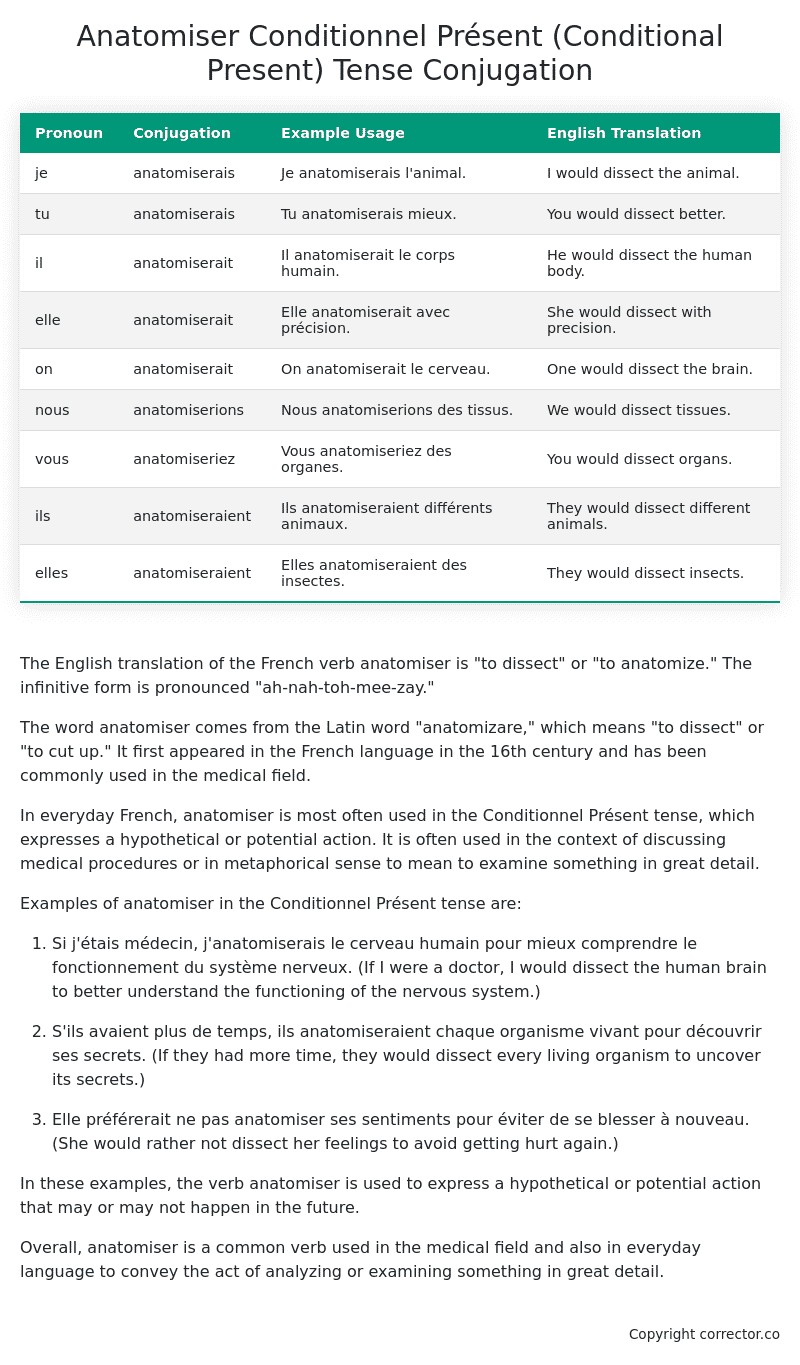Conditionnel Présent (Conditional Present) Tense Conjugation of the French Verb anatomiser
Introduction to the verb anatomiser
The English translation of the French verb anatomiser is “to dissect” or “to anatomize.” The infinitive form is pronounced “ah-nah-toh-mee-zay.”
The word anatomiser comes from the Latin word “anatomizare,” which means “to dissect” or “to cut up.” It first appeared in the French language in the 16th century and has been commonly used in the medical field.
In everyday French, anatomiser is most often used in the Conditionnel Présent tense, which expresses a hypothetical or potential action. It is often used in the context of discussing medical procedures or in metaphorical sense to mean to examine something in great detail.
Examples of anatomiser in the Conditionnel Présent tense are:
-
Si j’étais médecin, j’anatomiserais le cerveau humain pour mieux comprendre le fonctionnement du système nerveux. (If I were a doctor, I would dissect the human brain to better understand the functioning of the nervous system.)
-
S’ils avaient plus de temps, ils anatomiseraient chaque organisme vivant pour découvrir ses secrets. (If they had more time, they would dissect every living organism to uncover its secrets.)
-
Elle préférerait ne pas anatomiser ses sentiments pour éviter de se blesser à nouveau. (She would rather not dissect her feelings to avoid getting hurt again.)
In these examples, the verb anatomiser is used to express a hypothetical or potential action that may or may not happen in the future.
Overall, anatomiser is a common verb used in the medical field and also in everyday language to convey the act of analyzing or examining something in great detail.
Table of the Conditionnel Présent (Conditional Present) Tense Conjugation of anatomiser
| Pronoun | Conjugation | Example Usage | English Translation |
|---|---|---|---|
| je | anatomiserais | Je anatomiserais l’animal. | I would dissect the animal. |
| tu | anatomiserais | Tu anatomiserais mieux. | You would dissect better. |
| il | anatomiserait | Il anatomiserait le corps humain. | He would dissect the human body. |
| elle | anatomiserait | Elle anatomiserait avec précision. | She would dissect with precision. |
| on | anatomiserait | On anatomiserait le cerveau. | One would dissect the brain. |
| nous | anatomiserions | Nous anatomiserions des tissus. | We would dissect tissues. |
| vous | anatomiseriez | Vous anatomiseriez des organes. | You would dissect organs. |
| ils | anatomiseraient | Ils anatomiseraient différents animaux. | They would dissect different animals. |
| elles | anatomiseraient | Elles anatomiseraient des insectes. | They would dissect insects. |
Other Conjugations for Anatomiser.
Le Present (Present Tense) Conjugation of the French Verb anatomiser
Imparfait (Imperfect) Tense Conjugation of the French Verb anatomiser
Passé Simple (Simple Past) Tense Conjugation of the French Verb anatomiser
Passé Composé (Present Perfect) Tense Conjugation of the French Verb anatomiser
Futur Simple (Simple Future) Tense Conjugation of the French Verb anatomiser
Futur Proche (Near Future) Tense Conjugation of the French Verb anatomiser
Plus-que-parfait (Pluperfect) Tense Conjugation of the French Verb anatomiser
Passé Antérieur (Past Anterior) Tense Conjugation of the French Verb anatomiser
Futur Antérieur (Future Anterior) Tense Conjugation of the French Verb anatomiser
Subjonctif Présent (Subjunctive Present) Tense Conjugation of the French Verb anatomiser
Subjonctif Passé (Subjunctive Past) Tense Conjugation of the French Verb anatomiser
Subjonctif Imparfait (Subjunctive Imperfect) Tense Conjugation of the French Verb anatomiser
Subjonctif Plus-que-parfait (Subjunctive Pluperfect) Tense Conjugation of the French Verb anatomiser
Conditionnel Présent (Conditional Present) Tense Conjugation of the French Verb anatomiser (this article)
Conditionnel Passé (Conditional Past) Tense Conjugation of the French Verb anatomiser
L’impératif Présent (Imperative Present) Tense Conjugation of the French Verb anatomiser
L’infinitif Présent (Infinitive Present) Tense Conjugation of the French Verb anatomiser
Struggling with French verbs or the language in general? Why not use our free French Grammar Checker – no registration required!
Get a FREE Download Study Sheet of this Conjugation 🔥
Simply right click the image below, click “save image” and get your free reference for the anatomiser Conditionnel Présent tense conjugation!

Anatomiser – About the French Conditionnel Présent (Conditional Present) Tense
Formation
Common Everyday Usage Patterns
Expressing Polite Requests
Expressing Hypothetical Situations
Expressing Doubt or Uncertainty
Interactions with Other Tenses
Present Tense
Past Tense
Future Tense
Conditional Perfect
Summary
Want More?
I hope you enjoyed this article on the verb anatomiser. Still in a learning mood? Check out another TOTALLY random French verb conjugation!


